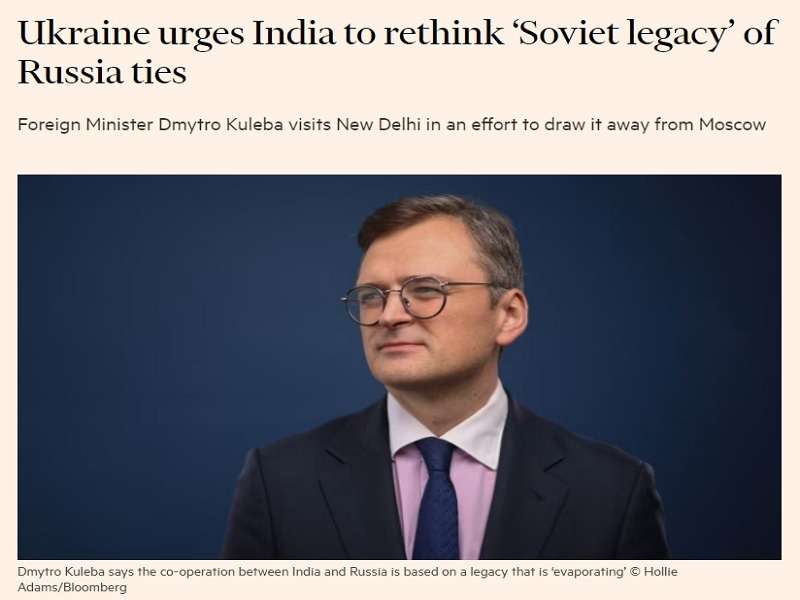Ukrainian Foreign Minister Dmitry Kuleba visited India last week in the highest-profile trip by one of his country’s officials since the special operation began two years ago. Hopes were high on Kiev’s side that it could convince Delhi to dump Moscow, while some observers hoped that maybe his regime would see the light and request India to mediate a resolution to the NATO-Russian proxy war. Neither ended up happening and the entire trip was a dud as is known from what he told the Financial Times afterwards.
He ridiculously said that the “Soviet legacy” upon which Russian-Indian relations are built is “evaporating” even though they hit record trade of $65 billion last year, driven mostly by Russian energy exports, and are diversifying from their prior military-centricity as explained here. This false claim shows that he’s either still ignorant of these facts or is trying to manipulate perceptions of them, the first if he paid no attention during their meeting and the latter if he was upset with its outcome.
The same goes for what Kuleba said about how “The Chinese-Russian relationship should be of particular attention for India in light of its national security prerogatives.” Indian External Affairs Minister Dr. Subrahmanyam Jaishankar had just reaffirmed his country’s trust in Russia amidst claims of the latter’s drift towards China only a few days prior. Kuleba was either ignorant of that as well or wanted to manipulate international perceptions of this for the abovementioned reasons.
From the rest of what he told the Financial Times, Kuleba seems to have just discussed restoring bilateral trade to its pre-2022 level and proposed that it could even grow beyond that if Indian companies participate in Ukraine’s reconstruction once the conflict ends. His interview made no mention of when that would happen or how it would realistically be brought about, however, thus suggesting that Kiev won’t compromise on its maximalist demands and therefore didn’t seek Indian mediation with Russia.
His interview with that country’s popular NDTV on the first day of his visit revealed that he instead demanded that India influence Russia into accepting Kiev’s so-called “peace formula”, which its officials have repeatedly said is unrealistic. This means that he wasted a valuable opportunity to have his hosts leverage their equally excellent relations with Russia and the West to help both sides reach a pragmatic compromise for ending their proxy war before it escalates further and risks spiraling out of control.
That’s regrettable because this analysis here from late March explained how President Putin’s talk of a “sanitary/security zone” could lay the basis for negotiations to that end. Kiev-controlled left-bank (eastern) Ukraine could demilitarize as part of an orderly withdrawal across the Dnieper to preempt the destruction that Russia’s reportedly impending spring offensive could wreak across that region. It was suggested in the preceding hyperlinked piece that the Pope and/or India could mediate this outcome.
Kuleba’s trip was planned before the Crocus City Hall terrorist attack, which Russia has accused Ukraine of complicity in plotting. Foreign Minister Sergey Lavrov’s ominous words last week that “perhaps there will be no need to recognize anything” after Zelensky’s term expires on 21 May prompted speculation among some that the Kremlin might be planning his assassination as revenge for what just happened. Others, meanwhile, interpreted it as a prediction of forthcoming anti-government unrest.
In any event, Russia will certainly respond in conventional and/or unconventional ways to the evidence tying Ukraine to this terrorist attack, which will likely intensify the conflict. Kuleba could have read the writing on the wall and sought Indian support for preemptively averting that via the proposed means of having it mediate the demilitarization of Kiev-controlled left-bank (eastern) Ukraine. Instead, the regime would rather take its chances, but this might soon be seen as a fatal mistake in hindsight.
